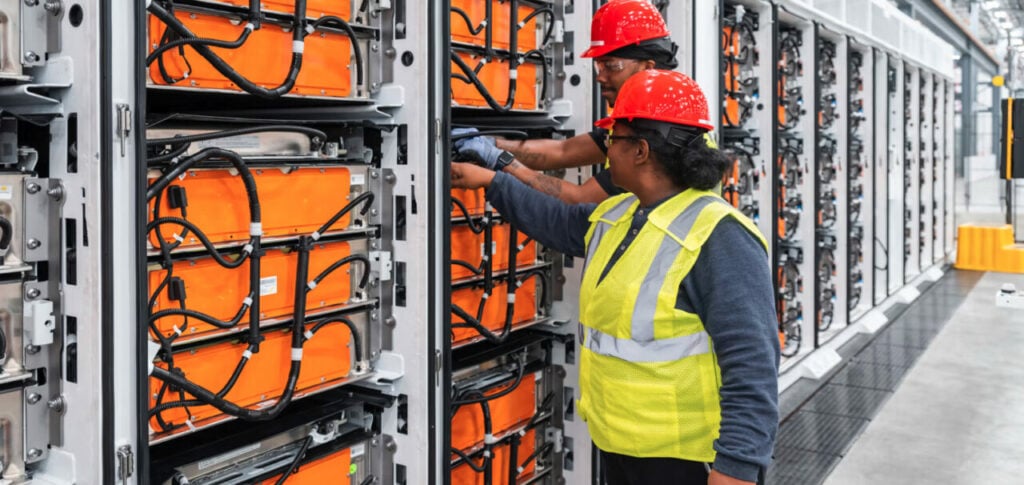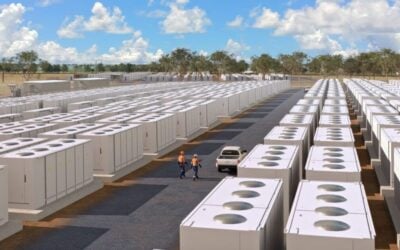
The BESS industry is looking at ways to leverage the 45X tax credit for domestic cell manufacturing in the US, with the domestic content investment tax credit (ITC) bonus still unclear.
That was according to delegates interviewed at Solar Media’s Energy Storage Summit (ESS) USA 2024 last month when discussing the Inflation Reduction Act’s (IRA) numerous incentives that are relevant for energy storage – a market that is booming in the US.
Enjoy 12 months of exclusive analysis
- Regular insight and analysis of the industry’s biggest developments
- In-depth interviews with the industry’s leading figures
- Annual digital subscription to the PV Tech Power journal
- Discounts on Solar Media’s portfolio of events, in-person and virtual
Just as we reported from the event last year, exactly how to qualify for the 10% domestic content adder to the 48E ITC for using domestically-produced BESS is still unclear, and further guidance is expected on it soon.
‘Terribly important’ to access 45X credit
The US$35 per kWh 45X tax credit for battery cell manufacturing (45X) and associated US$10 per kWh for module manufacturing is much clearer, and is where BESS companies should be focusing their thinking, consultancy Clean Energy Associates’ (CEA) VP market intelligence Dan Shreve said.
“The need to access that 45X credit at the cell level is terribly important. It’s where most of the money is, and why companies like Kore Power continue to move forward in their plans to localise production in the US,” Shreve said.
He pointed out EV and BESS firm Tesla’s recent partnership with China-based lithium-ion cell manufacturer CATL, whereby Tesla will use the latter’s IP and machinery to build battery cells in Nevada for its BESS assembly plant in Lathrop, California (according to a Bloomberg report in January 2024).
Shreve added that Tesla has made some “…bold claims about satisfying domestic content tax credits, though whether those benefits are passed down to the client is a different question”.
Most capacity announced focus on EVs
The bulk of announced cell manufacturing capacity announced in the US is nonetheless destined for the electric vehicle (EV) market.
Part of this is because US lawmakers are reluctant to let Chinese companies set up local manufacturing and take advantage of the IRA’s incentives, but it is those Chinese companies that have virtually all of the lithium iron phosphate (LFP) technology capabilities.
“That is limiting the uptake (of cells manufactured for ESS) in the US market,” said Darrell Furlong, director of product management and hardware for system integrator Wärtsilä ES&O (energy storage & optimisation).
The EV market mainly uses nickel manganese cobalt (NMC) chemistry and this is more diversified outside of China.
Different form factors make accessing capacity designed for EVs difficult too, Shreve added: “There is a lot of talk about how ESS could access that capacity, however ESS mainly uses prismatic while EV packs largely use cylindrical cells, introducing complications.”
System integrators tracking ESS cell capacity availability
Wärtsilä is investigating US manufactured cells for its future BESS products, Furlong added, something echoed by Ray Saka, VP business strategy and services for another system integrator IHI Terrasun.
“We at IHI track this closely and we’re establishing partnerships with a plan in place for US manufacturing so that we have a strong standing to answer those (domestic content) needs. It’s about the tax credit but also potential concerns around forced labour too,” Saka said.
“There are definitely some activities in cell manufacturing for BESS, but most companies are focusing on doing everything else other than cells – module and DC block manufacturing. That is the initial focus, cells require strong technical know-how, and they need the baseline material supply chain too.”
In related news, another system integrator Nidec ASI announced today that its Cleveland, Ohio, BESS manufacturing facility has now added power conversion system (PCS) and EV charger manufacturing capabilities. The products there will help deliver the equipment for a 75MW BESS project in Texas it won a contract for from energy storage investment fund Gore Street late last year.
System integrators manufacturing their own cells?
The potential of system integrators manufacturing their own battery cells and taking advantage of 45X directly also came up in conversations, but this appears unlikely, with all companies consistently talking about the benefits of being ‘technology-agnostic’.
Setting up in-house gigafactories would require a long-term commitment to a specific cell technology, something they are reluctant to do in a market which moves very fast.
There are companies that do both cells and BESS, but these tend to be gigafactory firms that have moved downstream rather than vice versa.
The exceptions are in China, like Trina Solar’s BESS arm Trina Storage, and we hear other China-based companies might follow. EV firms like Tesla and BYD can afford to make the long-term bet on lithium-ion, which few argue will not be the dominant EV chemistry for years to come.






